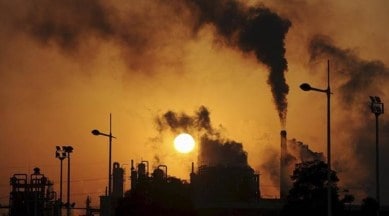‘Not doing enough’: IPCC report warns global warming will breach critical threshold by 2030
Global surface temperature has increased faster since 1970 than in any other 50-year period over at least the last 2,000 years, the IPCC report showed.

Reiterating its earlier findings, the Intergovernmental Panel on Climate Change on Monday reminded the world yet again that it was still not doing enough to rein in global temperatures from breaching the 1.5 degree Celsius threshold despite there being “multiple, feasible and effective options” to do so.
In its latest report, the IPCC, a UN-backed global scientific body, said average temperatures had already touched 1.1 degree Celsius above the pre-industrial times, and the 1.5 degree Celsius threshold was “more likely than not” to be reached in the “near term” itself.
“The synthesis report says that by 2030 there is a 50 per cent chance that global surface temperature in any single year could exceed 1.5 degrees Celsius. The modelling shows that it is theoretically possible to limit warming to 1.5 degrees Celsius, but the current scale, scope and pace of global action, pledged until 2030, is not enough. We are not on track, and the report reiterates this,” said Professor Joyashree Roy, one of the 93 authors of the Synthesis report.
Roy said if the temperature rise overshoots the 1.5 degree threshold, there could be irreversible damages.
Of the 1.1 degree Celsius temperature rise since pre-industrial times, about 1.07 degree Celsius was contributed by human activities, the new report said. It said the world had emitted about 2,400 billion tonnes of carbon dioxide between 1850 and 2019, of which a little over 1,000 billion tonnes, or about 42 per cent, had been emitted after 1990.
In order to have a 50 per cent chance of keeping warming below 1.5 degree Celsius, the world must not emit more than 500 billion tonnes of carbon dioxide equivalent after 2020, the report said. Incidentally, current annual emissions in 2019 amounted to 59 billion tonnes. That means that the 500 billion tonnes carbon budget would be exhausted in less than ten years.
The Synthesis Report also highlighted the fact that climate impacts were “unequally distributed” with the poor and disadvantaged being the most vulnerable. Accordingly, it stressed that the strategies to counter climate change needed to be rooted in “diverse values, worldviews and knowledge, including scientific knowledge, indigenous knowledge and local knowledge”.
“This approach will facilitate climate resilient development and allow locally appropriate, and socially acceptable solutions,” it said.
Aditi Mukherjee, another author of the report, said India was among the countries that were expected to face largescale impacts.
“Even though India’s per capita emissions are less, and we have much less historical responsibility (of emissions), the reality is India is at the forefront of impacts. We simply cannot say that because we haven’t emitted much, we would not be the ones to take action. Everybody has to take action according to their national context and circumstances urgently,” Mukherjee said.
The report said that while adaptation planning and implementation had progressed across all sectors and regions, large gaps existed.
“For those irreversible impacts that turn into losses and damages, the report emphasises on the need for better quantification of those losses and damages, as we still do not have those quantified as well as the policy makers need to for negotiations,’’ Mukherjee adds.
Joyashree Roy said India’s future development needed to be in sync with the climate objectives.
“In terms of energy, India is one of the developing countries which have been practising energy efficiency in all sectors, be it the household sector, industry sector or transport sector. So, from that point of view, India could achieve low per capita emission growth because of one of these policies. India can increase it more but it has done a lot in that sense already. India can decarbonize the energy supply sector by not only solar and wind renewable energy deployment but using other cleaner options. What India can also do is to reduce the demand for energy and do the distributional justice by reducing wasteful energy use,” she said.
“On the demand side, when India is expanding its cities or urban infrastructure, it can see how it can integrate the infrastructure design which allows more space for cyclists, pedestrians or better public transport system, access to different technologies for recycling food waste reduction etc,’’ Roy said.
The IPCC report said limited resources, insufficient finance, low sense of urgency, lack of political commitment were among the key barriers to effective climate action.
“Apart from public finance, there are other avenues including private finance, local finance, national and international, bilateral, and multilateral finance. And this can take the form of grants, technical assistance, loans, bonds, equity, risk insurance, and financial guarantees. This means that we should not only be thinking in terms of the flow of finance from developed to developing countries. However, accelerated financial support for developing countries from developed countries and other sources is a critical enabler to enhance adaptation and mitigation actions in the developing countries. But it is also very important that public finance is an important enabler of adaptation and mitigation, and can leverage private finance,” Roy said.